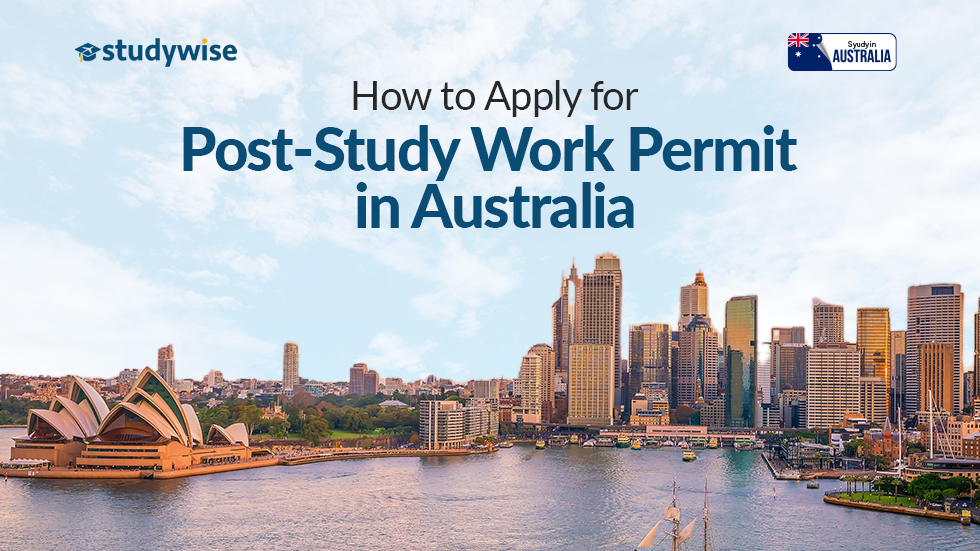Australia, with a large number of international students flying to the country every year, has become a preferred destination for those seeking a world-class education and diverse career opportunities. In 2023, employment rates in Australia peaked, with a whopping 64.2% increase from the previous years.
However, if you are considering applying for a post-study work permit in Australia (PGWP), it’s important to stay up-to-date with the latest policies. Recently, the Australian government announced some changes to its post-study work rights policy for international students, which will impact how long graduates can stay in the country for work purposes.
So, before you lodge your application for this visa, make sure you keep the recent changes in mind and plan accordingly. With the right preparation and guidance, you can make the most of your post-study work opportunities in this amazing country. Want to learn everything about the post-study work permit in Australia?
Well, you have landed in the right place. Here, we have outlined everything you need to know about the Australian work permit so that you can successfully apply for a visa. Get the ball rolling and read ahead!
How Long Can International Students Stay in Australia on a Post-Study Work Permit?
In the past, the Australian government had extended the duration of post-study work visas for undergraduates, master’s, and PhD students in selected programs. On this visa, people used to stay in Australia for up to 4 to 6 years, depending on their level of study. However, now, the Australian authorities have cut the duration of this visa and reverted it to the original 2 to 3 years. Australia’s Department announced this update in Feb 2024.
Types of Work Permits in Australia
So many students, after getting done with their degree program, start dreaming of staying and working in Australia. If you are also among those students, you need to apply for a post-study work permit. Also, keep in mind that there are 3 types of post-study work visas that are provided by the Australian government based on the applicant’s qualifications:
- Temporary Graduate Visa Subclass 485 (Post-Study Work): It allows students to stay in Australia for 2 to 4 years.
- Temporary Graduate Visa Subclass 485 (Graduate Work): It allows students to stay for up to 18 months in Australia.
- Skilled Recognized Graduate Visa Subclass 476: It allows applicants to stay for 18 months in Australia.
Who Can Apply for Work Permits in Australia?
In order to apply for any of the 3 streams of post-study work visas, you must be aware of the requirements, which we have discussed here:
1. Temporary Graduate Visa Subclass 485 (Post-Study Work)
The post-study work stream visa is the most highly applied visa by international students. Students who have graduated from a reputable Australian institution in any relevant area of study are eligible for this visa.
However, you need to make sure that you apply for this visa stream within 6 months after the completion of this course. The length of your stay in Australia on this visa will depend on your qualifications. Generally, the stay-back period is between 2 and 3 years.
2. Temporary Graduate Visa Subclass 485 (Graduate Work)
The graduate work visa is designed particularly for foreign students who have graduated with the qualifications and skills identified in the list of skilled occupations. Hence, to be eligible for this visa, you must have skills and occupations closely related to those that will be in most demand in Australia’s job market in the coming years.
Students on this visa are permitted to stay for up to 18 months in the Land Down Under and work.
Note: You should apply for this visa within six months of course completion.
3. Skilled Recognised Graduate Visa Subclass 476
A Skilled, Recognised Graduate Visa is for those foreign students who have completed an engineering degree from an accredited Australian educational institution in the last 2 years. The stay-back period on this visa is for up to 18 months.
What are the Requirements for a Post-Study Work Visa in Australia?
Students are not required to land a job offer before they apply for a post-study work permit in Australia. However, you’ll still have to fulfil the following conditions:
- You need to apply for the work permit after or within 6 months after you have completed your degree program.
- You should meet the Australian study requirements. These entail that students require a minimum of 16 months of stay-back periods in Australia. Moreover, they need to have a course completion period of at least 92 weeks.
- Your study programs should be registered with the Commonwealth Register of Institutions and Courses for Overseas Students, or CRICOS.
- The course you studied at an Australian institution must be in English.
What are the English Proficiency Requirements for a Post Study Work Visa?
Australian authorities have also set some English proficiency requirements for applicants who are applying for study permit visas in this country:
The minimum scores required for the following English proficiency tests are:
- IELTS: At least 6.5
- TOEFL iBT: 64
- PTE: 57
In addition, to be granted the visa, you should have adequate health coverage for the duration of your stay as well. It typically includes medically necessary treatment and transport.
You must also meet Australia’s character requirements to apply for a postgraduate work permit. Also, make sure that your visa is not cancelled or refused while you are residing in this country.
Benefits of Staying in Australia on a Post-Study Work Visa
Being one of the top economies in the world, Australia allows foreign students to find growth opportunities while working in this country. Students can find a broad spectrum of possibilities in a myriad of fields, such as education, business, healthcare, engineering, etc., that will advance their career goals.
Another significant advantage of applying for a work permit in Australia is that it can lead to permanent residency there. On top of that, it provides a great way to obtain valuable work-related skills and execute those skills to resolve real-world issues.
Hence, applying for a post-study work visa grants you many opportunities to gain valuable work experience and skills in Australia. This will ultimately enhance your employability and career prospects across the globe.
Note: Studying abroad can be expensive, but with StudyWise, you won’t have to worry. We’ll help you learn about the available scholarships and bursaries in Australia, especially if you are on a tight budget.
So, book a free consultation session with us today and follow your aspirations!
Contact Us Now
Steps to Apply for a Post-Study Work Visa in Australia
Here are the steps you need to follow while applying for a work permit after you complete your studies:
- Firstly, go to the official Australian government immigration and citizenship website.
- Then, create an account and pick the type of after-study work permit in Australia that you are looking for.
- Submit all the required documents and complete the visa application
- Provide your biometric details (if required).
- Pay the mentioned visa application fees.
- Attach all the essential documents during the submission process.
You may also need to appear for the visa interview in front of the officials and provide some additional information during the interview.
Once you receive your work permit after studying in Australia, you will receive a letter notifying you that you are now able to work in the country.
Now, let’s learn about the processing time and validity of post-study work permits in Australia:
What is the Processing Time of a Post-Study Work Permit in Australia?
You might now be thinking about how long it usually takes to process your Australia after-study work permit. According to the Department of Home Affairs (DHA), if you have applied for a Graduate Work Stream visa in Australia, it will take between 10 and 13 months to process your application. On the other hand, the post-study work stream visa or Australia work permit after a master’s may require between 7 and 14 months to process your application.
What is the Validity of a Post-Study Work Permit in Australia?
The validity of the post-study work permit is usually based on the type of graduate visa for which you have lodged your application and the level of your qualifications.
- The graduate work stream visa lets foreign students stay in Australia for up to 18 months after completion of their studies.
- Whereas the stay-back period in Australia for master’s or post-work visa holders can last between 2 and 4 years.
- Post-study skilled visa holders are permitted to remain in Australia for up to 18 months.
What Can You Do If Your Passport Expires Before PGWP Australia?
One of the most important things that you need to keep in mind before the application is to have a copy of your passport during the validity of your post-study work visa. If your passport has expired before the application for an Australia Post study work permit, there are a set of instructions for it that you need to abide by:
If you have a new passport and your visa is electronically linked to your previous passport, you should update your visa with immigration so that it can be electronically linked to your new passport.
Note: There are chances that the immigration authorities will contact you regarding the extension of your passport.
Allow us to Help You!
Australia provides equal opportunities to its native students and foreign students regarding high-class education and job prospects. Its world-class universities make it easier for students to secure job offers and achieve success in their careers. This makes sense as to why students who fly to Australia for study purposes decide to stay in this country for a little longer and find employment opportunities.
Hence, if you are also an international student who completed your education in Australia, make the most of your stay in this country and apply for a post-study work permit. However, to get this visa, you need to start planning well ahead of time to confirm that you don’t have to face any rejections.
Forget feeling lost in the crowd and contact StudyWise. Our dedicated counselors are fully aware of every student’s individual goals and aspirations. Thus, they provide customized assistance to students while helping them choose the right program, create a winning application, and ace their interview.
What are you waiting for? Book a free consultation session now with our professionals and maximize your chances of success!
Contact Us Now
Download Our App
StudyWise, launched in 2021, is one of the best study apps for overseas students. It enables students to save and shortlist educational institutions, and courses in their destination. Its user-friendly interface makes it simple to view and compare different career options in seconds.
Download it now from the App Store or Play Store; your dream of studying abroad is just a few clicks away!
FAQs:
What is the new rule about post-study work visas in Australia?
From early 2024, 485 visa English language requirements will change. The required test score for a Temporary Graduate visa will increase from an IELTS score (or equivalent) of 6 to 6.5. For English Language Intensive Courses for Overseas Students (ELICOS), candidates should have an IELTS 5.0 or equivalent score.
Can I get PSW after a 1.5-year Masters in Australia?
Yes, you can. All master’s programs in Australia are eligible for a three-year post-study work visa.
Can a 485 visa lead to permanent residency?
Yes. The Post Study Work Visa often paves the way for meeting the criteria for a permanent visa. So, if you are working in this country on a post-study work visa subclass 485, you have a bright chance of securing permanent residency here.
How much does post-study work visa subclass 485 cost?
If you are applying for a post-study work visa subclass 485, the charges will start from $1400 + GST with an additional $400 for each dependent.



